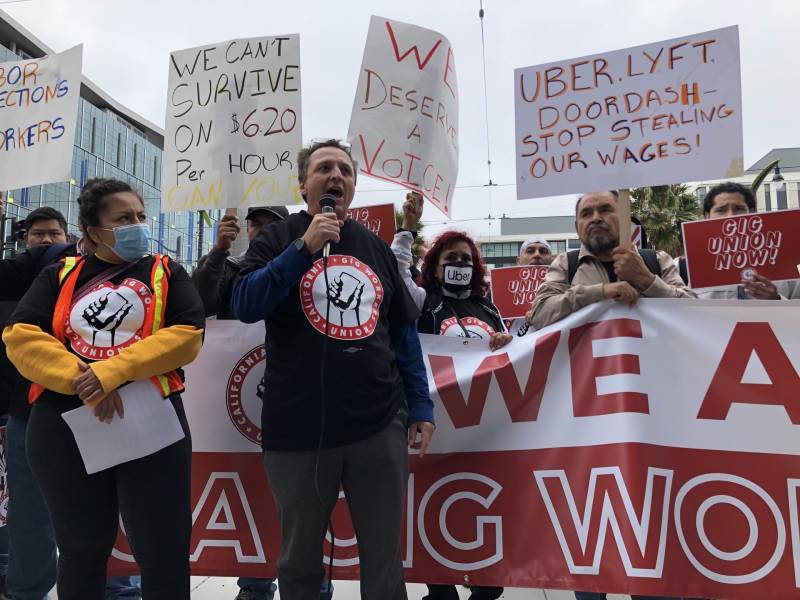The rally comes during a week when Uber, Lyft and DoorDash stock prices plunged after the federal government unveiled proposed rules that could make it easier for gig drivers, as well as millions of construction and home care workers, to be treated as employees.
The proposed changes aim to “combat misclassification,” which also hurts the economy, according to a statement by the U.S. Department of Labor.
“We have seen in many cases that employers misclassify their employees as independent contractors, particularly among our nation’s most vulnerable workers,” wrote Secretary of Labor Marty Walsh. “Misclassification deprives workers of their federal labor protections, including their right to be paid their full, legally earned wages.”
An estimated 1.37 million people worked on at least one ride or delivery for DoorDash, Instacart, Lyft and Uber platforms in California between 2020 and 2021.
Nearly two years ago, California voters approved a ballot initiative that exempted Uber, Lyft, DoorDash, Instacart and other app-based businesses from having to treat drivers as employees. Proposition 22 is currently in effect but is being challenged in state court.
The companies, which spent more than $200 million to get that measure passed, say changing how they classify drivers threatens the survival of their businesses. In addition, they argue most drivers prefer to remain as independent contractors.
“With more than 1 million unfilled traditional jobs and record low unemployment in the state, drivers are still choosing this work because of the earning potential, benefits, independence, and flexibility it provides,” wrote a spokesperson for Lyft. “The special interest groups that claim to support drivers should listen to the vast majority of them who want to keep what they have under Prop 22.”
Lydia Olson, who owns a consulting business in Sacramento, fears that becoming an employee would mean she could no longer drive for Uber and Lyft, as she has done for the past five years. She worries that the legal challenge to Proposition 22 or changes to federal rules could strip her of her choice to supplement her income when and where she chooses, for as long as she wants.
“It’s a scary time,” said Olson, 55. “I mean, how would you feel if you knew that the politicians could turn off your ability to work permanently overnight? And there’s nothing you could do about it, because that’s what we are looking at.”
Olson said a flexible schedule allows her to care for her husband, who has multiple sclerosis. She estimates she makes $30 an hour in net income as a driver, even with recent increases in gas prices.
“There’s a reason why so many people choose independent contracting and that’s because it works for them, and that’s their choice. And we all know there’s trade-offs,” she said. “So it makes no sense to force us to be employees, because we didn’t choose that.”
Spokespeople for Uber, Lyft and DoorDash said Proposition 22 delivered a 120% minimum wage guarantee for drivers, while offering health care subsidies and other benefits. They pointed to a UC Riverside analysis that concluded drivers earned $25.17 per active hour in 2021, not including tips. The study was commissioned by the Protect App-Based Drivers and Services coalition, of which Uber, Lyft, DoorDash and Instacart are members.
However, a separate report authored by researchers at PolicyLink and Rideshare Drivers United last month estimated drastically lower earnings for these gig workers. According to that study, typical rideshare drivers in California are taking home just $6.20 an hour, in part because they are not paid for the total time they are working.
In statements, Uber, Lyft and DoorDash spokespeople slammed those findings as “deeply flawed,” criticizing the small sample used for the analysis, which was based on data from 3,020 trips by 21 drivers.
But several full-time drivers at the protest told KQED that they make significantly less than $15 an hour after they deduct the costs of driving, such as gas and car maintenance, and must work long days to make ends meet.
“If you’re not going to work 12, 13 hours a day, you’re not going to survive,” said Armen Oganesyan, 57, who drives for Uber and Lyft in Los Angeles. “We basically live in the car … We are working every day from Monday to Sunday.”
The California Gig Workers Union, which representatives said is a movement of tens of thousands of people, merges two groups that had operated in the southern and northern regions of the state for years: the Mobile Workers Alliance and We Drive Progress.

